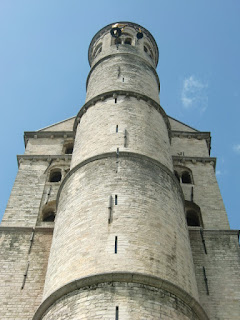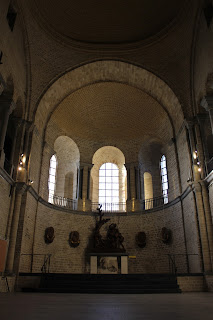Collegiale St Gertrude

A Little History
St Gertrude died on March 17 in the year 659 A.D. She was probably in her early to mid thirties at the time of her death. She and her mother, Itta, founded an abbey in what is now called Nivelles. It is thought that the abbey came first, and the town soon grew up around its perimeter, serving the needs of the abbey and the pilgrims who stayed there. Her father was Pepin (the Elder) of Landen, a descendant of the first Merovingian King Clovis and his well-named descendants, such as the several Pepins (including Pepin the Short but not the Tall), Charles Martel, Charlemagne, and Louis the Pious. This lineage of Frankish barbarians founded what is now known as France. Gertrude's father was a lesser noble who served in the court of another well-named Merovingian, Dagobert. Gertrude showed aversion to the notion of marriage, despite the duty this could serve to her family and the noble heights to which she might rise, and was, upon Pepin's death, allowed to enter the monastic life. This may have been a protection for her against the possibility of a forced marriage aimed at taking any lands or titles she might inherit upon the death of male members of her family. Itta, too, chose the monastic life, perhaps for the same reasons.
The Monastery
asflakjsdflk asdlfkjasdflk
adslkjasdlfk
asdlfjksdl;lk sadlkfjaslkdjf ad;skjalsdk alk slk adlksd adlksd Ads;lkasd asdlfkjasldk sdlkadflkasdflkad asdl;fkajsdlfkajs df asdlfkjsd sdflka
,klkj
lulkjlk
 The Ambulatory
The Ambulatory
 Jean de Nivelles is a 13th century mechanical man, clad in gold tunic and skirt, who rings a bell. He strikes the hour, with a succession telling the hour, and every fifteen minutes a single strike rings out. Belgians are fond of timeliness, I would venture to say, so this measuring of the day is of practical use. Careful observation reveals that old Jean's hammer does not truly strike the bell. His mechanical parts squeak and groan as he makes his swing, but the hammer misses its target by a clear margin. There must be another bell inside to provide the sound. Jean de Nivelles has become one of the symbols of the town and a very good beer has been named for him.
Jean de Nivelles is a 13th century mechanical man, clad in gold tunic and skirt, who rings a bell. He strikes the hour, with a succession telling the hour, and every fifteen minutes a single strike rings out. Belgians are fond of timeliness, I would venture to say, so this measuring of the day is of practical use. Careful observation reveals that old Jean's hammer does not truly strike the bell. His mechanical parts squeak and groan as he makes his swing, but the hammer misses its target by a clear margin. There must be another bell inside to provide the sound. Jean de Nivelles has become one of the symbols of the town and a very good beer has been named for him.
Jles is suspended from the top of the south tower and
askljaslefkas fa dads as;dlfkja;sldkfjas das;dlfjalsdfk ad;flkajsdf laksdjfal ksdf;lk adf;lakjsdflas asd;lfkjasdf;lajdlk asdflkjasdfl slk asdk s;asdkf asdfk
Decision
After my father's death, my uncle intended to use me for the advancement his own power and prospects. He would marry me to whatever lesser noble he wished to form an alliance with, whenever the opportunity might present itself. I, of course would not be consulted about the arrangement, and the probability that the union would be distasteful to me would be high. That I had no say in the matter would likely guarantee such an outcome. My property would be forfeited to this man or to the more powerful nobles of his line, my lands and titles included, and I would be feted for a year at most before being shunted off to spend my life alone in the confines of an obscure, unknown residence. My husband, as much as he could be called such, would soon return to his own affairs, my purpose having been spent.
How my dear uncle was finally convinced to allow my mother and I to enter the monastic life remains a mystery to me. But I am persuaded that his decision was forced. He had every reason to forbid this, for once decided, it could not ever be undone. For the rest of our lives, he shunned my mother and me, so it is clear to me that he was bitter about his loss of us. He lost no small amount of prestige, as well, and his influence suffered. Reports reached our ears of his presence in Belgie on more than one occasion, yet he never made any attempt to contact us. Our

A Little History
St Gertrude died on March 17 in the year 659 A.D. She was probably in her early to mid thirties at the time of her death. She and her mother, Itta, founded an abbey in what is now called Nivelles. It is thought that the abbey came first, and the town soon grew up around its perimeter, serving the needs of the abbey and the pilgrims who stayed there. Her father was Pepin (the Elder) of Landen, a descendant of the first Merovingian King Clovis and his well-named descendants, such as the several Pepins (including Pepin the Short but not the Tall), Charles Martel, Charlemagne, and Louis the Pious. This lineage of Frankish barbarians founded what is now known as France. Gertrude's father was a lesser noble who served in the court of another well-named Merovingian, Dagobert. Gertrude showed aversion to the notion of marriage, despite the duty this could serve to her family and the noble heights to which she might rise, and was, upon Pepin's death, allowed to enter the monastic life. This may have been a protection for her against the possibility of a forced marriage aimed at taking any lands or titles she might inherit upon the death of male members of her family. Itta, too, chose the monastic life, perhaps for the same reasons.
Mother and daughter established a monastery with sections for men and women. Itta was abbess for the first dozen years or so, until her death, at which time Gertrude became abbess. These were the early years of Christianity in this region, and the establishment of monasteries like Nivelles moved the Christian world forward, toward its more commonly understood medieval form.
Vita Sanctae Geretrudis was composed by an unknown biographer in about the year 700, about forty years after Gertrude's death. In it, she is described as ...... At least two miracles are attributed to Gertrude. Fist, she witnessed a brilliantly shining orb of light descend upon the altar of martyred Pope Sixtus II; and storm-struck monks on monastery business claim prayers to her put an end to the foul weather and sea monsters threatening their crossing to Great Britain. It's not surprising at least one of her miracles would have something to do with the weather.
The Monastery
asflakjsdflk asdlfkjasdflk
adslkjasdlfk
asdlfjksdl;lk sadlkfjaslkdjf ad;skjalsdk alk slk adlksd adlksd Ads;lkasd asdlfkjasldk sdlkadflkasdflkad asdl;fkajsdlfkajs df asdlfkjsd sdflka
,klkj
lulkjlk
 The Ambulatory
The Ambulatory
nnNotable Tombs sklsldjkf
Notable Tombs sklsldjkf
Notable Tombs sklsldjkf
asldfkj
Jean de Nivelles Jean de Nivelles is a 13th century mechanical man, clad in gold tunic and skirt, who rings a bell. He strikes the hour, with a succession telling the hour, and every fifteen minutes a single strike rings out. Belgians are fond of timeliness, I would venture to say, so this measuring of the day is of practical use. Careful observation reveals that old Jean's hammer does not truly strike the bell. His mechanical parts squeak and groan as he makes his swing, but the hammer misses its target by a clear margin. There must be another bell inside to provide the sound. Jean de Nivelles has become one of the symbols of the town and a very good beer has been named for him.
Jean de Nivelles is a 13th century mechanical man, clad in gold tunic and skirt, who rings a bell. He strikes the hour, with a succession telling the hour, and every fifteen minutes a single strike rings out. Belgians are fond of timeliness, I would venture to say, so this measuring of the day is of practical use. Careful observation reveals that old Jean's hammer does not truly strike the bell. His mechanical parts squeak and groan as he makes his swing, but the hammer misses its target by a clear margin. There must be another bell inside to provide the sound. Jean de Nivelles has become one of the symbols of the town and a very good beer has been named for him.
sldkjsdaflkj
asdflkj ads
f
askljaslefkas fa dads as;dlfkja;sldkfjas das;dlfjalsdfk ad;flkajsdf laksdjfal ksdf;lk adf;lakjsdflas asd;lfkjasdf;lajdlk asdflkjasdfl slk asdk s;asdkf asdfk
Decision
After my father's death, my uncle intended to use me for the advancement his own power and prospects. He would marry me to whatever lesser noble he wished to form an alliance with, whenever the opportunity might present itself. I, of course would not be consulted about the arrangement, and the probability that the union would be distasteful to me would be high. That I had no say in the matter would likely guarantee such an outcome. My property would be forfeited to this man or to the more powerful nobles of his line, my lands and titles included, and I would be feted for a year at most before being shunted off to spend my life alone in the confines of an obscure, unknown residence. My husband, as much as he could be called such, would soon return to his own affairs, my purpose having been spent.
How my dear uncle was finally convinced to allow my mother and I to enter the monastic life remains a mystery to me. But I am persuaded that his decision was forced. He had every reason to forbid this, for once decided, it could not ever be undone. For the rest of our lives, he shunned my mother and me, so it is clear to me that he was bitter about his loss of us. He lost no small amount of prestige, as well, and his influence suffered. Reports reached our ears of his presence in Belgie on more than one occasion, yet he never made any attempt to contact us. Our
 |
| Every church is a fortress, and a fortress needs a well for water during the siege. |
 |
| The cloisters wrap around in a covered square arcade. Meant for monk's ambulation in prayer and meditation, it is now used for special events. |
























Comments
Post a Comment